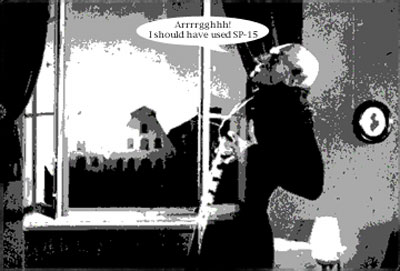
F.W. Murnau’s Nosferatu
Graphic by ©2004, UrbisMedia
It would certainly appear outrageous in this day and age for anyone to assail the widespread concern in American over healthier living. Health is unarguably the one facet of life that certainly fits the axiom that “more is better.” No rational person would wish for less health, for pain, suffering, the ravages of disease, or premature death. At the social level, less toxic waste, air pollution, radiation, harmful drugs and other dangers are goals, which on their face, have few, if any, detractors.
Still, there is something paradoxically unhealthy in all this concern for health. Even the most worthy and laudable social changes, like some of the things we do to improve our health, have their negative side affects. I am not referring to runner’s knee, back problems from aerobics, or excesses like diets consisting solely of broiled roots and herb tea, though these are not trivial concerns. Rather, my concern might be expressed as a warning that: Excessive concern over one’s health might be injurious to one’s attitude . More specifically, it appears that along with lighter, better-toned bodies, improved cardio-vascular systems, and abstinence from formerly unhealthy habits, the health movement has created a social type with an unhealthy social attitude— the health bigot.
Bigotry, we all know, is rooted in attitudes of (usually imagined) superiority. The classic, intolerant, and often mean-spirited and prejudicial bigot is typically someone with a deep-seated inferiority masked in an attitude of superiority based on race, class, religion, or some other social attribute, or a moral posture. Bigots come in all forms, and the health bigot is hardly the most dreaded type. Still, while more health is good we certainly don’t need more bigotry in the world.
So the first thing we need to do is recognize the characteristics of health bigotry. To be sure, not everybody who is concerned with better health is a health bigot or is likely to become one; but one of the ways we can find out about our own susceptibility to this attitude disease is to take the Health Bigot Test . So get out a pencil and a piece of paper and write the answer “yes” or “no” to the following dozen health bigot questions. Ready? Here goes.
- When your are booking a table at a restaurant do you ask if they have a fat-free-low cholesterol section?
- Do you regard people who smoke as the equivalent of child molesters and wave your hands frantically and feign coughing spells when they light up?
- Do you show up at parties in a velour exercise suit?
- Is your idea of entertaining friends to offer them fruit juice, rennetless cheese and unsalted crackers, but after they have done a Pilates workout with you?
- Do you have a “personal trainer”?
- Are the only T-shirts that you have ones with the words “marathon” or “10-K” written on them?
- Have you gifted anyone among your friends and family Dr. Phil’s books?
- Do you think that Michelangelo’s “David” has poorly “cut” abdominals?
- Do you provide your dinner guests with your food’s breakdown of tryglycerides, high-density lipoproteins, and amino acids?
- Does you garage have more that six pieces of exercise apparatus that you bought from infomericals?
- Have you ever made a cheesecake with tofu?
- Do you deny that Adoph Hitler was a vegetarian?
So, how did you do? Well, let’s see. Three “yes” answers make you a “health snob”; six “yes” answers puts you in the “health evangelist” category. But more than six “yes” answers indicates that you are already a health bigot, and you need to get to work on that while you still have some friends and relationships left to lose. I’m not suggesting that that you take up smoking, fatty foods, and the exercise regimen of a couch potato. It’s not your healthy habits that are the problem, just your unhealthy attitude. First, you need to recognize that “live and let live” is just as valid an axiom as “you are what you eat.” Second, you need to exercise a little less muscle and a whole lot more tolerance. Third, admit that your physical health is threatening the mental health of others. Only then will you appreciate that longevity isn’t so much fun if you spend it all by yourself.
___________________________________
©1988, ©2004, James A. Clapp (UrbisMedia Ltd. Pub. 6.18.2004)
Aired KPBS-FM, Public Radio, December 16, 1988
